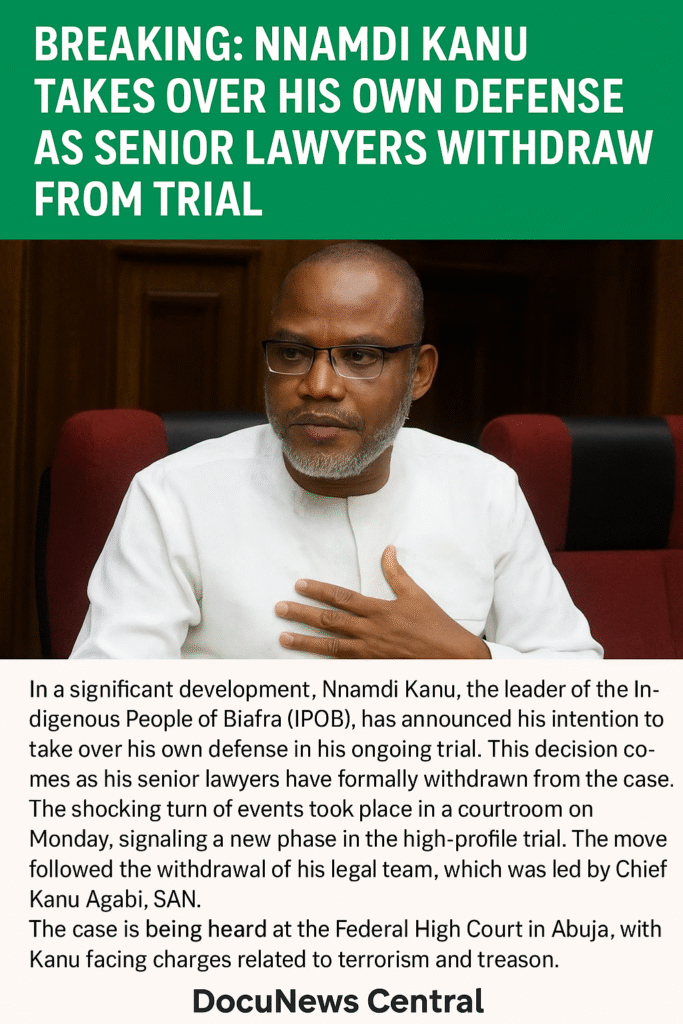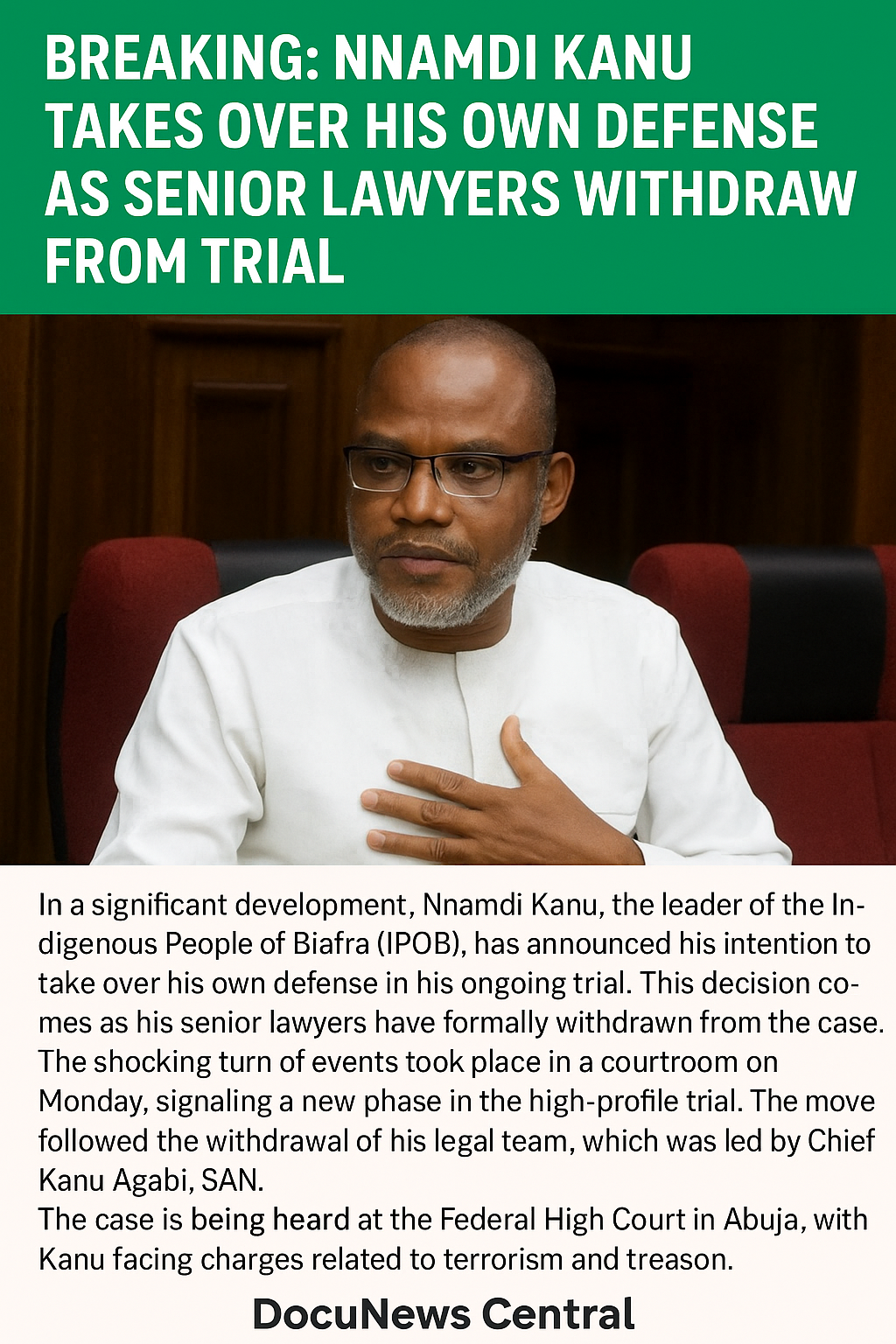
By DocuNews Central – October 2025
In a surprising courtroom twist, the detained leader of the Indigenous People of Biafra (IPOB), Nnamdi Kanu, has officially taken over his own defense after his team of senior lawyers, led by former Attorney-General of the Federation and Minister of Justice, Chief Kanu Agabi (SAN), formally withdrew from his case. The development, confirmed by several reputable media outlets including The Guardian Nigeria, Leadership, and The Cable, marks a significant shift in one of Nigeria’s most closely watched legal battles.
The decision by the senior lawyers to step down came during a court session at the Federal High Court in Abuja. According to reports, Chief Kanu Agabi told the court that he and his team would no longer be representing Kanu in the ongoing trial. The IPOB leader immediately informed the presiding judge that he would henceforth represent himself in court.
Nnamdi Kanu’s Bold Decision to Defend Himself
Kanu’s choice to personally handle his legal defense took both the courtroom and the public by surprise. His move, while rare, underscores his growing frustration with the Nigerian judicial process and his determination to take control of his case. According to The Cable, Kanu told the court that he no longer had confidence in his former legal team’s ability to defend him effectively. Instead, he expressed readiness to face the government’s charges alone.
“I have decided to represent myself,” Kanu reportedly said during the hearing. “I know the law and I know the facts of my case better than anyone.” His statement drew murmurs of surprise across the courtroom as journalists and supporters watched closely.
Why Kanu Agabi (SAN) and Team Withdrew
Sources close to the legal team revealed that the withdrawal was not entirely unexpected. Chief Kanu Agabi (SAN), a respected figure and former Minister of Justice, allegedly made the decision after several unresolved disagreements within the defense camp. While the specific reasons were not publicly disclosed, multiple reports suggest that communication breakdown and strategic differences between Kanu and his lawyers contributed to the move.
The Guardian Nigeria confirmed that all Senior Advocates of Nigeria previously on Kanu’s defense team have now stepped down. This includes top constitutional lawyers who had been handling various aspects of his terrorism and treason-related charges.
In his brief address to the court, Agabi reportedly thanked the judge for his patience and expressed hope that Kanu would find justice, regardless of his personal decision to continue without counsel.
The Charges Against Nnamdi Kanu
Kanu has been standing trial on multiple counts of terrorism and treasonable felony. The charges stem from his activities as the leader of the proscribed Indigenous People of Biafra (IPOB), which the Nigerian government accused of promoting secession and inciting violence. He was first arrested in 2015 and later granted bail in 2017, but he fled the country afterward. His re-arrest in 2021 after being extradited from Kenya reignited tensions in the Southeast and brought renewed scrutiny to Nigeria’s justice system.
The federal government claims that Kanu’s broadcasts and directives led to unrest in parts of the Southeast, including attacks on security formations. However, Kanu has consistently maintained his innocence, arguing that his activism is peaceful and rooted in the constitutional right to self-determination.
What This Means for the Trial
With Kanu now representing himself, the trial could take a new direction. Legal analysts say that self-representation in such a complex criminal case is risky, especially in terrorism-related trials. However, some see it as a calculated move by Kanu to draw international attention to what he perceives as injustice.
“This is not just about law—it’s about symbolism,” said Lagos-based constitutional lawyer, Barrister Chidi Onwu. “Kanu wants the world to see that he is confident in his cause and willing to stand alone if necessary.”
Observers believe that Kanu’s self-representation might also delay proceedings, as the court will need to ensure that due process is followed even without formal counsel. However, the presiding judge reportedly assured him that his rights would be protected and that he could reappoint a legal representative at any stage of the trial.
Reactions From Across Nigeria
The announcement sparked mixed reactions across Nigeria. In the Southeast, some IPOB supporters viewed the move as an act of courage and defiance, praising Kanu for taking control of his destiny. Others expressed concern that it could weaken his defense against the government’s well-resourced prosecution team.
On social media, hashtags like #FreeNnamdiKanu and #KanuInCourt began trending shortly after the news broke. Supporters flooded online platforms with solidarity messages, while critics questioned the wisdom of representing oneself in a high-stakes federal trial.
Political observers noted that Kanu’s latest action could have implications for the broader political climate in Nigeria, especially with growing calls for dialogue between the federal government and aggrieved groups in the Southeast.
Statements from IPOB Members and Family
Kanu’s younger brother, Prince Emmanuel Kanu, expressed confidence that his brother’s decision would not derail the pursuit of justice. “He is a strong man, and he knows what he’s doing,” he told reporters outside the courtroom. IPOB spokespersons also released a statement praising Kanu’s courage and reaffirming the group’s commitment to peaceful self-determination.
“Our leader has always been the voice of the voiceless. His choice to represent himself is a declaration that truth cannot be silenced,” IPOB’s statement read. They also accused the Nigerian government of deliberately frustrating Kanu’s legal team to weaken his case—an allegation the government has consistently denied.
The Federal Government’s Response
Government prosecutors did not publicly comment on the development, but insiders revealed that the federal team was unfazed by the defense change. According to a source quoted by Leadership Nigeria, the prosecution believes the case will proceed as scheduled since “the evidence speaks for itself.”
The government has repeatedly maintained that the trial is not politically motivated but rather a lawful process aimed at addressing national security concerns. The Attorney General’s office reiterated that Kanu’s right to fair hearing remains guaranteed under Nigerian law.
Legal Experts Weigh In
Legal experts are divided on whether Kanu’s self-representation will benefit or harm his case. Some argue that no matter how intelligent a defendant may be, legal procedures and technicalities are best handled by experienced lawyers. Others believe that self-representation allows him to directly challenge the narrative against him.
Professor A. S. Obioha, a constitutional law scholar at the University of Nigeria Nsukka, said: “Representing oneself in a case of this magnitude is a high-risk strategy. However, in political trials, symbolism often carries as much weight as legal arguments.”
Meanwhile, human rights groups have called for fairness and transparency in the proceedings. Amnesty International has also urged Nigerian authorities to ensure that Kanu’s rights are not violated as he continues his self-defense.
Implications for the Southeast and Nigeria’s Political Climate
Nnamdi Kanu’s ongoing trial remains a flashpoint for tension in Nigeria’s Southeast. Many residents believe the government’s handling of the IPOB issue has worsened regional unrest. Analysts fear that the latest development could further inflame sentiments among Kanu’s supporters, especially if they perceive the trial as biased.
In contrast, some observers believe that his self-representation could eventually create an opening for renewed dialogue between the government and Southeast leaders. “If managed carefully, this could be an opportunity to revisit the larger conversation about inclusion, justice, and regional development,” noted a political analyst quoted by Channels TV.
Calls for Calm and Dialogue
Amid rising tensions, traditional rulers and community leaders from the Southeast have appealed for calm. They urged both the federal government and IPOB supporters to allow the judicial process to run its course. According to them, peace and constructive dialogue remain the best path toward resolving longstanding grievances.
In a related development, several civic organizations have encouraged the federal government to create more empowerment programs for youth in the region. Initiatives such as the YouthCred Loan Scheme—recently covered by DocuNews Central—are seen as positive steps toward addressing economic frustrations that fuel agitation.
What Happens Next?
The court has adjourned Kanu’s case to a later date for continuation of trial. During the next hearing, he is expected to present his preliminary objections against the charges. Legal watchers are eager to see how he will navigate the complexities of Nigerian criminal law without the support of senior counsel.
While some believe his decision to represent himself could lead to procedural challenges, others see it as a bold move that could reshape public perception of the case. What is certain is that all eyes will remain fixed on the Federal High Court in Abuja as this dramatic legal battle unfolds.
Conclusion
Nnamdi Kanu’s decision to take over his own defense marks a turning point in his long-running legal saga. Whether this move strengthens or weakens his position remains to be seen, but it undeniably adds a new dimension to one of Nigeria’s most polarizing trials.
As events continue to develop, DocuNews Central will provide verified updates and in-depth analysis on the situation. For readers interested in related national developments, explore other exclusive stories on DocuNews Central.
Copyright © DocuNews Central – All Rights Reserved.











